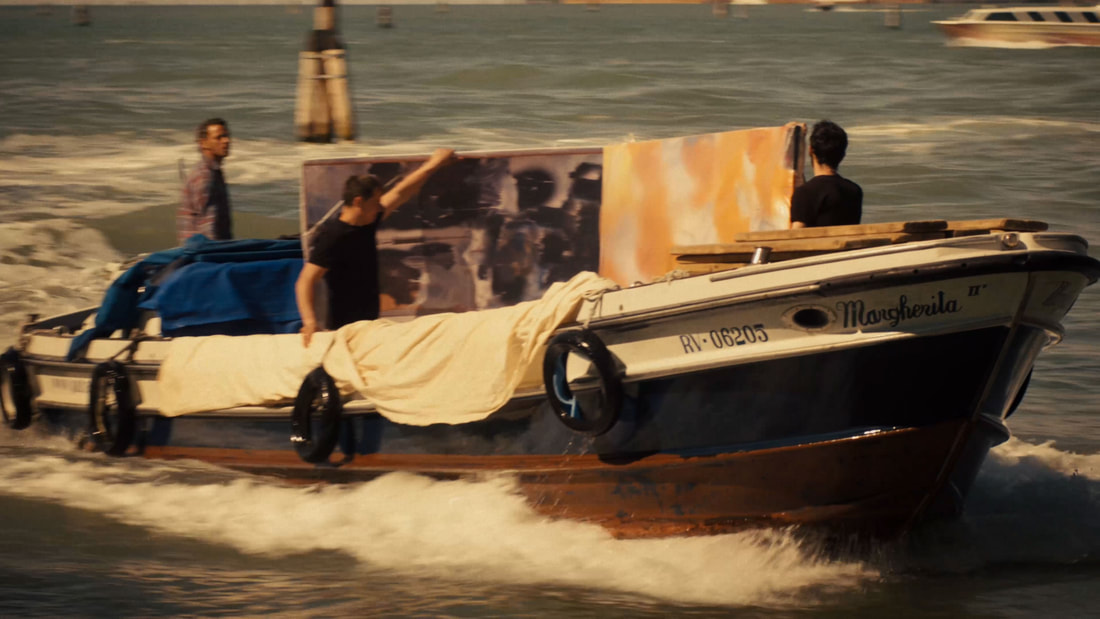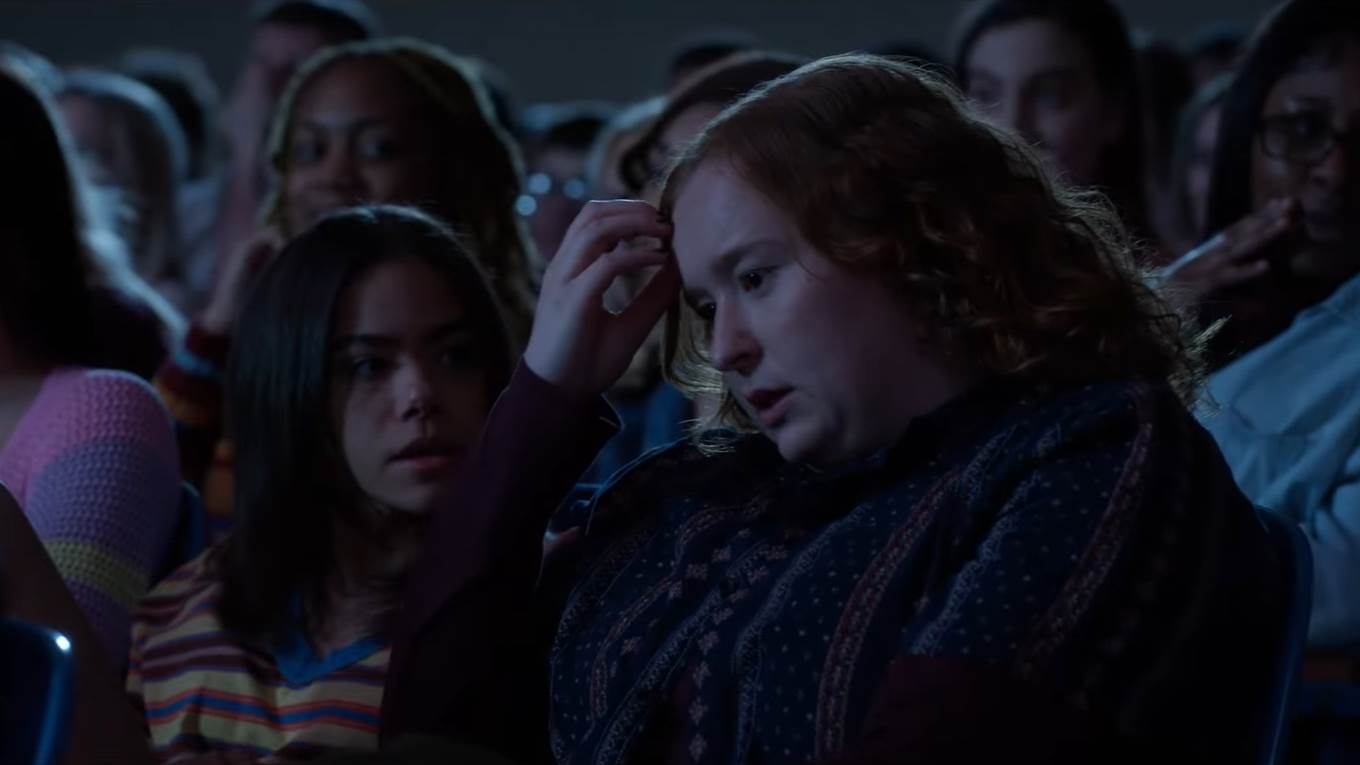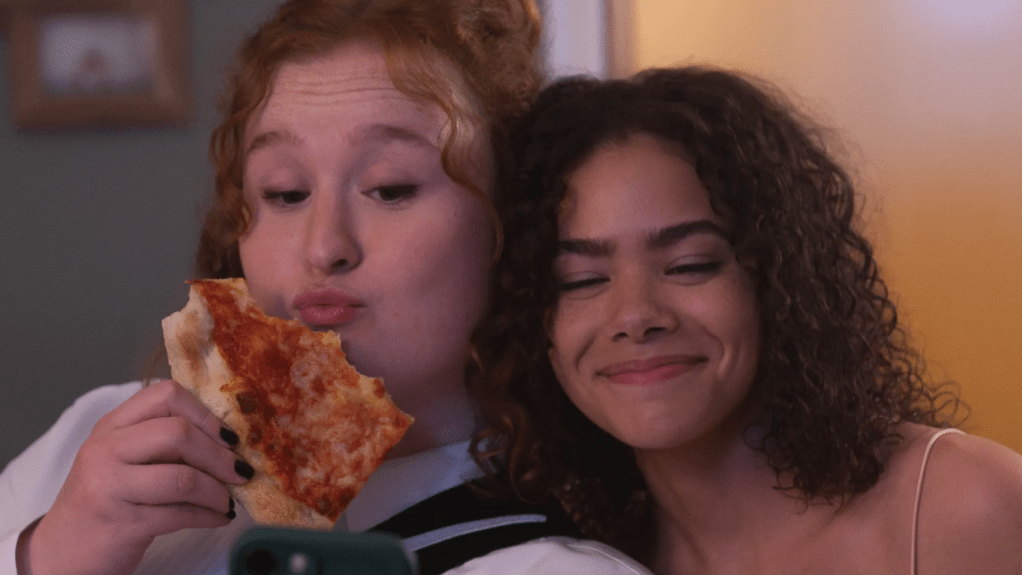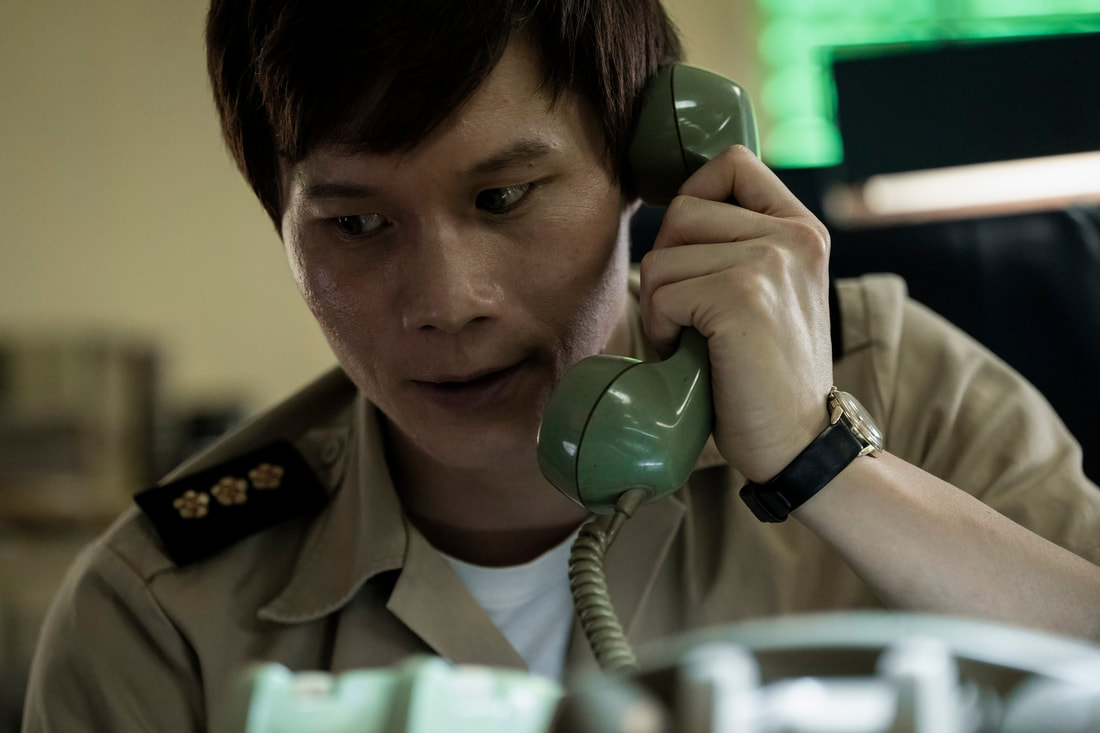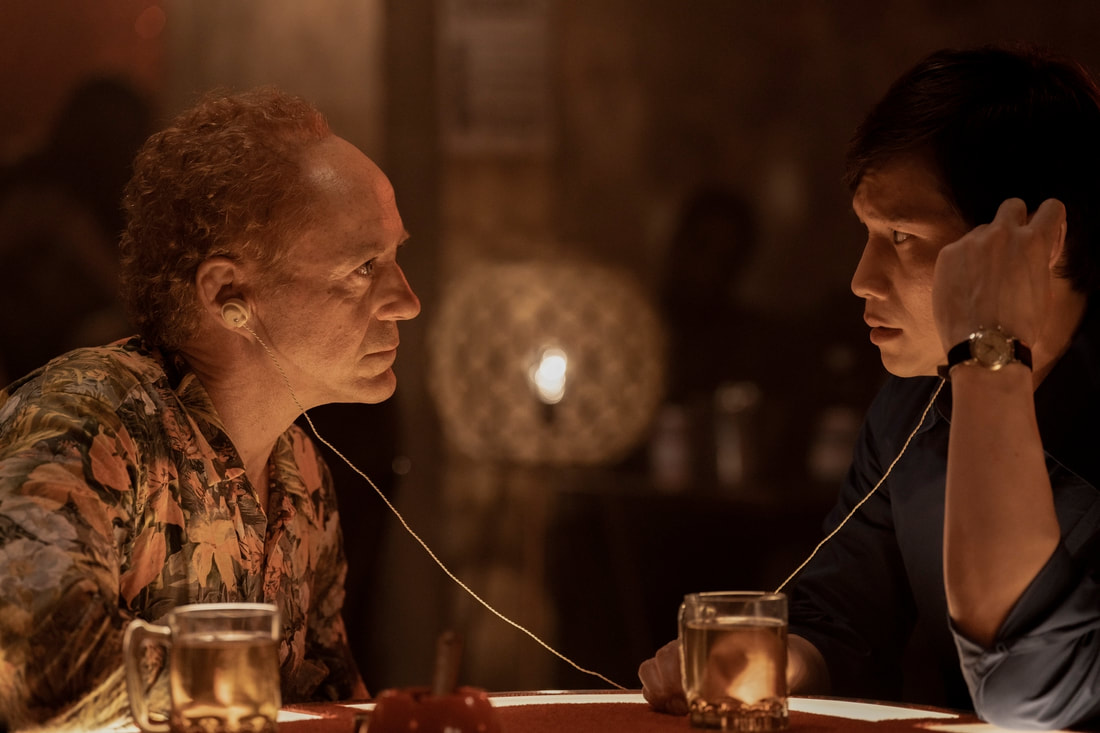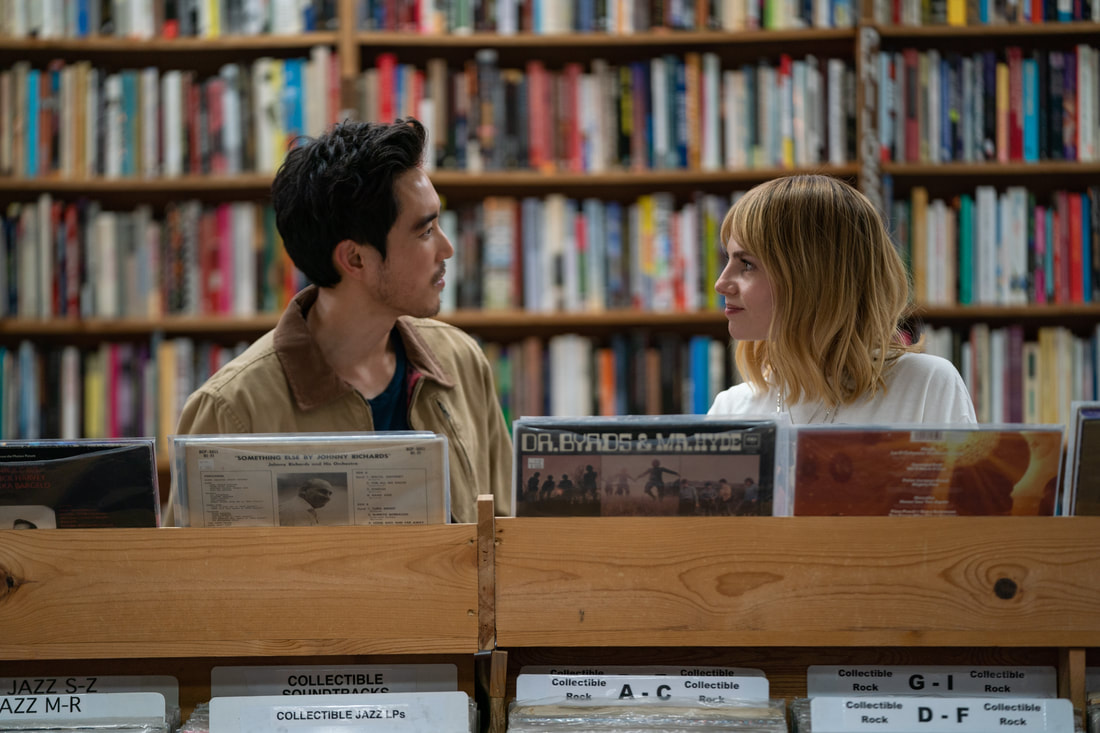|
Review by Jonathan Berk Writer and director Niclas Larsson's film Mother, Couch is an anxiety-inducing examination of family issues delivered by a stellar cast. Larsson thrusts the audience into the film's surreal world, primarily set in an antiquated furniture store. It's a jarring experience that will make audiences question whether they missed the beginning of the film, but it establishes the tone that will carry through for the entirety. Ewan McGregor is at this furniture store with his estranged brother, played by Rhys Ifans, and their elderly mother, Ellen Burstyn, takes a seat on a couch and refuses to leave. The store is run by Taylor Russell and her father, F. Murray Abraham, and becomes an odd place to hash out the family baggage. The brothers call their sister, Lara Flynn Boyle, to come and help them figure out what to do about their mother. McGregor's character is working through many issues. He performs really well in this chaotic role. He is the anchor for all of the story elements, and each character has some connection to him. The film's ticking clock is McGregor getting to his daughter's birthday party. His wife, played by Lake Bell, is calling and inquiring when he'll arrive, but he can't abandon his mother despite how awful she is towards him. Burstyn delivers this cruel, biting performance as the family's matriarch. She has to give a big performance while mostly sitting on a couch, which she does expertly. The writing adds to the experience, but the same lines said by someone less capable wouldn't have the punch they do here. Of course, it's also the reactions to the words that help sell the overall idea.
Boyle and Ifans get some solid moments as well. The three siblings have an interesting past that's explored throughout the film. However, Russell and Abraham make the most of their screen time. They act as the keepers of the reality the characters find themselves in and offer sagelike advice or throw threatening commentary on the actions of these strangers invading their space. The decision to make this story a little more surreal adds to both the tone and the creativity. Several scenes allow for aesthetically interesting visuals. The staging of the furniture store mirrors the rooms of a house, lending to the exploration of our character's past. The metaphors the film is working with allow it to hit its visual stride later on. The third act, in particular, really makes the most of the odd reality the characters find themselves living in and will push the audience's willingness to accept it or storm out angry. All of these elements mix reasonably well, but they don't make for an enjoyable experience. It's hard to watch Mother, Couch and not be reminded of Ari Aster's Beau is Afraid — another film that sought to make its audience uncomfortable, but one that executes the approach a little bit better. Still, Niclas Larsson's film is well-made and gets its idea across enough to make it worth watching. Mother, Couch will be in theaters on July 5. Rating: 3.5/5
0 Comments
Review by Jonathan Berk Some movies hold a mirror up to our lives, and we will see ourselves in it. Those are often powerful moments that make an audience member feel seen. However, it is often more impactful when a movie opens a window and allows us to see a world we are less familiar with. Those worlds can be fantastical and fictitious, but sometimes they feel like we're looking in our backyard, and we somehow never quite noticed a specific detail right in front of us the entire time. Director Erica Tremblay's Fancy Dance is the latter, offering a view of a world often overlooked by American society that deserves a closer look. The film follows Lily Gladstone's character, Jax, after her sister's disappearance as she struggles to take care of her niece, played by Isabel Deroy-Olson. The system seems determined to separate her family, and out of desperation to find her sister and keep her family together, the two hit the road to the Grand Nation Powwow in Oklahoma City. Gladstone continues to demonstrate her onscreen power in another emotionally quiet but powerful performance. Her performance is an iceberg with a cool and collected outward demeanor, but her eyes reveal the many complex emotions underneath. Her performances convey so much going on in her head while keeping her composure to those around her. If the story calls for an outburst of that emotion, she is also up for that, but she clearly has a grasp of the power of film acting. The subtlety she brings to her characters and the stories continues to impress. This particular film allows her to flex her skills to great effect. Deroy-Olson's debut and style mesh quite well with Gladstone. She's much younger, and her character, Roki, is a little naive. Her optimism and youthfulness make her naivety forgivable and are used to really drive the point of the film home. All Deroy-Olson's character wants to do is make it to the Powwow, where she believes her mom will be, and they'll participate in the family dance ceremony. It's far more than a MacGuffin as it sets the stage for the various systemic problems related to living on the reservation. The characters in the film feel forced to use less than ethical means to get by. In the opening sequence, Jax and Roki embrace nature and collect supplies. They come across an older man fishing, and Jax tries to distract him while Roki raids his tackle box. As they leave the woods, we see them steal the truck and take it to a shop where they sell what they've collected and stolen to get by. This scene initially plays with tone and is a bit of silly fun at first, but later, as other events unfold, it takes new meaning.
Jax's life is not easy, and it was apparently even more challenging for her sister. Interactions with other characters, especially the sisters' father, played excellently by Shea Whigham, and his new wife, played by Audrey Wasilewski, show the challenges put up against them. As the film progresses and Jax and Roki decide to head to the Powwow despite the warnings about it, it becomes clear that there isn't a great outcome for Jax in the world she's living in. Fancy Dance is beautiful and sorrowful and is another showcase for Gladstone. Tremblay has given audiences a movie that is heartfelt and informative. Hopeful and devastating. Movies like this embody Roger Ebert's words, allowing audiences to live in someone else's shoes. An opportunity to see problems through a lens we otherwise would have no access to knowing. Fancy Dance is in theaters on June 21 and streaming on Apple TV+ on June 28. Rating: 4/5 Review by Jonathan Berk The parasitic relationship people have with their favorite sports teams is easily observable. When the team is winning, the fans tend to reflect the positive emotions we associate with victory and success. If their team is losing, they tend to take out their frustrations wherever and whenever they see fit. That only gets worse if your team is “cursed.” David Duchovny set out to knock his new film, Reverse the Curse, over the Green Monster as writer, director, and one of the main stars. Ted (Logan Marshall-Green) is at a loss for what to do with his life until he finds out his estranged father, Marty (Duchovny), has been diagnosed with a fatal illness. Ted observes that his dad’s illness elevates every time his beloved Boston Red Sox lose, so he develops a plan to make him happy and keep him alive. He reaches out to Marty's grief counselor (Stephanie Beatriz) and his neighborhood friends to fake a Red Sox winning streak. There are often allegations of emotional manipulation for movies that want to make you cry. Duchovny's film has a few moments where that may feel like a valid complaint, but ultimately, the story is attempting to tug at the audience's heartstrings. If it succeeds, as it did with me, you'll probably walk away with a bit of love for the film — even if a bit begrudgingly. However, as more time passes since the credits rolled, the more I feel the film has earned its major emotional beats. It's hard to pinpoint which character is the heart of the film. Logan Marshall-Green is at the center and does a terrific job playing Ted, a pothead writer with daddy issues. Ted’s emotional journey serves as the hub for which the other characters are connected to. Still, there is something very special about Duchovny's performance and character that makes it hard not to argue in favor of it as the true heart of the film. Of course, Stephanie Beatriz truly makes the most of every scene she is in, and her character's arc is the one that made me shed real tears. The three make an emotional trinity of the father, son, and silly jokes.
The theme that resonates the most in the film is regret. All three characters have something from their past that is haunting them in the present. Some of those moments are on the surface, but a lot is bubbling underneath. This is mirrored in the well-known mythology of the Boston Red Sox's curse and how it loomed over the team for almost a century. It's hard to say if the team or the fans were impacted the most by the lack of a winning season for so long. Duchovny’s decision to wrap these characters' personal curses with the teams was effective. The period elements in the film add an interesting aesthetic to the story being told. The '70s clothes and cars add that sense of nostalgic longing that is easily associated with regret. Each character is clinging to their past struggles and trying to make sense of the present. These elements mesh well together to establish the vibe. Reverse the Curse is an emotional drama full of heart and humor. Duchovny manages to bring some heavy emotional content with enough levity to keep it palatable. Ultimately, the reliability of the characters and the dynamics between them really make it work. Reverse the Curse will be in theaters and on VOD on June 14. Rating: 3.5/5 Review by Jonathan Berk Artificial intelligence in movies is not new, but it is likely to have a resurgence in the coming years. Director Brad Peyton's latest film, Atlas, is the most recent entry in the canon of films centering around the technology. While it often looks kind of bad, it manages to find an emotional core that audiences may be willing to invest in. That core — paired with a familiar, yet compelling, formula — makes it very easy to watch. Atlas Shepherd (Jennifer Lopez) is a talented data analyst with deep trust in artificial intelligence. She joins a mission to capture Harlan (Simu Liu), a rogue robot, because of a mysterious connection from her past. It becomes clear that the only chance she has to save humanity from AI is to learn to trust it. There is no getting around how silly some of this film looks. The mechwarrior-esque design that Lopez spends most of her time inside of during the film makes it seem like she was in a closet performing many of the scenes. The action cuts from her inside to a CG jungle of robot mayhem. It doesn't look terrible, but it also doesn't look good. It is easy to tell that she doesn't always know how to sell the reactions or the drama. It would be almost intolerable if not for the relationship that is also encased in these moments. Lopez's character has an AI called Smith, voiced by Gregory James Cohan, inside the suit. Maybe it's because we live in a world where many of us talk to some form of AI to text our friends, play music, or turn the lights off, but this relationship feels familiar. It could also be that Cohan has a lot of personality in his performance and some genuine chemistry with Lopez. This dynamic helped to get me invested in the movie enough to care about all the nonsense that was present. Mark Strong, Sterling K. Brown, and Liu don't quite get nearly enough screen time. However, each gets something to do and sells their moments enough to make an impact. While there are plenty of familiar tropes in this film, they manage to not lean into all of them too hard. The military aspects of several characters are actually downplayed a little, which was surprising given how many elements are a bit over-the-top. There is enough restraint in the screenplay that was kind of refreshing to see in a movie like this.
The sci-fi elements here are on full display in this film. There are obvious Blade Runner references to the "bots" feeling like replicants. After the prologue that establishes the circumstances of this world, we follow a team as they try to apprehend Casca (Abraham Popoola). It's a bombastic action sequence that leads to an interrogation scene. The look of the city and the following interrogation definitely owe quite a bit to Ridley Scott's classic. After those moments, we see the mech suits and then space travel. It's a science fiction smorgasbord. Atlas doesn't stray far from what is expected for a sci-fi movie focused on the dangers of artificial intelligence. The story is pretty predictable, but that relationship at the core of it all really does some heavy lifting. Of course, if you don't like Smith or Atlas, you probably won't care that much at all. Fortunately, it was enough to get me invested. Atlas will be streaming on Netflix on May 25. Rating: 3/5 Review by Jonathan Berk Creating a documentary that feels like you're watching a spy thriller is no easy feat. With Taking Venice, director Amei Wallach manages to tell this true story in a way that makes it feel less like a documentary through innovative visuals and a propulsive score. Historical docs often find their audience simply because the subject matter is engrossing, but this film shows you can sometimes have your cake and eat it too. Taking Venice tells the story of the first time an American artist entered the Venice Biennale at the height of the Cold War. Determined to fight Communism with culture, Alice Denny, a Washington insider, Alan Solomon, an art curator, and Leo Castelli, a powerful art dealer, look to make artist Rauschenberg the winner of the Grand Prize. Wallach moves back and forth, developing the scheme while simultaneously informing the audience of the art movement of the time as well as Rauschenberg’s contemporaries. It doesn't take long for Wallach to demonstrate that this isn't the average archival footage and still picture documentary. While those are present, the film blends them together with modern footage in ways that showcase the art. A still photo in a sepia tone will merge with full-color moving video to create a unique visual style. There are moments when newspapers in France or Italy are displayed, and then the language morphs into English to reveal the content for the likely American audience. These visual embellishments add a distinct style that makes it stand out from other historical documentaries. The score by Chee Wei Tay is the next element that makes this film pop. It's so energetic and feels like one you'd hear in a spy or crime thriller. It makes each element of the story feel a little more dangerous than it really is. While a “conspiracy” or “scheme” is happening, it doesn't seem like the stakes were all that high. Yet, the film sets out to make it feel like they were, and the score does much of the heavy lifting with regard to this. The final piece that really makes everything click into place is the presentation of the importance of art. Present is a combination of elements that discuss the impact of the various fights for equality in the '50s and '60s, and how the art of the time reflected that. The cultural impact of the various artists of the time essentially becomes weaponized to combat Communism, but the artists themselves have their own agenda. The power of art is no mystery to cinephiles, but the movie and the subject matter do a great job selling it.
The film fills its audience with a feeling of discovery and anticipation. Unless you’re already intimately familiar with the subject matter, you will likely learn something new at multiple points. The framing of a conspiracy being uncovered only helps to hook the audience and bring them along on the journey. Taking Venice is a very well-made documentary that tells a story about which any art lover should know. There were so many elements that I knew nothing about prior to watching, and I was captivated the entire time. The art that is displayed in both the archival footage and the modern day exhibits holds historical significance. Again, this could have easily just been a PBS documentary with talking heads and photographs Ken Burns-ing their way across the screen. Instead, it's something much, much more. Taking Venice will be in theaters on May 17. Rating: 4.5/5 Review by Jonathan Berk Mothers need love, too — especially if they've been so focused on taking care of their only daughter for the majority of the last twenty years. Though it's never easy to let your child grow up, it is eventually a necessity that you stop taking care of them so you may finally focus on yourself. That's essentially the point of Mother of the Bride. Lana (Brooke Shields) finally sees her daughter, Emma (Miranda Cosgrove), after she's been in London for an entire year. Emma drops the big news that she's engaged and getting married in a month in Thailand, which will be a part of her new business. While it's not easy to step back, Lana is surprised to find that her future son-in-law's father is the lost love of her life from college. Shields is definitely game for the comedy in the film. Several moments feel a bit cheesy, but she makes it work despite the material. Cosgrove and Shields have enough talent to mostly sell the mother-daughter relationship, but the dialogue does them no favors. Nearly every moment that contains conflict feels overly fabricated and far too melodramatic. The history between these two is filled in with clunky exposition that will make audiences roll their eyes or laugh with a hint of derision. If the actors didn't have the talent, the film would be quite unwatchable. Benjamin Bratt plays the father of the groom (Sean Teale), and it is always a treat to have him in a project. Bratt looks fantastic, and the history between his character and Shields's is by far the most compelling storyline in the film. His introduction leads to one of the aforementioned eye-rolling scenes, where they fall into the pool in one of the more cliche rom-com-type moments. While director Mark Waters has delivered some pretty beloved films, including Mean Girls and Freaky Friday, there is an undeniable Hallmark movie sheen in this one. The overall aesthetic is too bright, and everything feels a bit too polished. There is almost something uncinematic about the look of everything that makes it seem as if it belongs amongst the ever-growing library of those beloved TV network movies.
The film absolutely pulls from recent releases in what almost feels like a mash-up of Crazy Rich Asians and Ticket to Paradise. The "exotic" setting with the excessive wealth and the focus on the parents of the happy couple rather than the couple themselves seems to pull from those recent rom-com successes. In the opening scene, RJ proposes to Emma at a fancy restaurant that he's emptied out, minus the staff and far too many flowers. It's gorgeous and excessive, which is a solid metaphor for this movie. It feels like it wants to be the wedding sequence from Crazy Rich Asians but is not quite capable of selling it the same. Still, Mother of the Bride isn't doing anything wrong. While the dialogue could have used a little bit of touch-up, it's a perfectly enjoyable entry to the genre. Other than feeling a bit like a made-for-TV movie, the performances help elevate the overall product. Even though every moment of drama feels far too contrived, the comedic elements help to counter the melodrama. Mother of the Bride will be streaming on Netflix on May 9. Rating: 3/5 Review by Jonathan Berk The Planet of the Apes franchise has always straddled the line between sheer entertainment and profound allegory. Audiences can watch it for the simple joy of a compelling science fiction narrative or dig deeper into the layers of meaning embedded in the story. Matt Reeves's entries elevated the franchise led by Andy Serkis's performance as Caesar, making film nerds debate why motion capture performances aren't recognized at the Oscars. With Wes Ball taking over where War for the Planet of the Apes left off, many were concerned that Kingdom of the Planet of the Apes would be another sad studio attempt at a cash grab. Fortunately for fans and moviegoers, it is a worthy entry in the series. Many generations have passed since Caesar died to save the apes. His teachings live on in some tribes but not in others. The Eagle Clan has built its own system of rules and lives in solitude. Noa (Owen Teague) is the son of the tribe's Chief Koro (Neil Sandilands) and is tasked with obtaining an eagle egg that he will raise in the tribe's tradition. However, his whole world is about to expand as a new tyrannical ape leader seeks to build his empire. Going into this fourth entry of the franchise, one thing that was concerning was if the CG's quality would take a dip, but it really didn't. This film has some absolutely gorgeous frames, and the characters are often photorealistic. That doesn't hold up in some scenes when there are a lot of apes, and the quality dims a lot. Still, anyone who thought this film would be less than will be surprised it is not. That rings true with both the story and the characters. While there is plenty of spectacle, Ball's film provides a wealth of moments to sit with the characters. When we meet Noa, he is troubled and struggling with so many parts of his life. He is working on a rite of passage, figuring out where he fits in with his clan, and then suddenly and drastically changing his way of life. The characterization is done so well, as is the world-building. There is exposition given in long stretches of dialogue, but it makes sense in the story being told. The Eagle clan has no knowledge of the past, but the two factions that Noa meets reveal similar information used for different purposes. This idea of knowledge being power — and how it is wielded by those who possess it — feels very pertinent. Noa becomes an audience surrogate who has no information on Caesar, and it makes sense that characters fill him in through these aforementioned stretches of dialogue.
Raka (Peter Macon) shines as a voice of reason and is a fantastic addition to the film. He is a strong character who instantly clicks into his role. Noa and Raka convey so much of the emotional weight in the movie that it's easy to forget these are CG characters. This concept has been the magic of this franchise, and we are fortunate this film can deliver it again. As noted, the film doesn't just have CG apes sitting around campfires talking. The opening sequence has Noa, Anaya, and Soona climbing to retrieve eagle eggs. There is an immediate sense of tension, and the stakes of the moment become clear. Pretty much every action scene in the film has a thematic weight to it that draws the audience in. These moments in the film work because the time was taken to invest in and develop the characters. It does seem to be the magic trick of this franchise: making human audiences root for the apes more often than the humans. Kingdom of the Planet of the Apes is peak blockbuster filmmaking. It has tons of spectacle but with characters that the audience will be invested in. The power of the sci-fi genre is on full display here, and Wes Ball proves he is a filmmaker to be taken seriously. This is a film that rewards seeing it with a crowd. Kingdom of the Planet of the Apes is in theaters on May 10. Rating: 4/5 Review by Jonathan Berk Is there a bigger moment in a high schooler's life than attending prom? It's one of those milestones that can really influence a person's post-high school life. Or, at least, filmmakers seem to think so, as it's the setting for so many movies. While it's impossible not to think of dozens of movies related to the big dance, director Kim O. Nguyen's film Prom Dates finds some new ground to tap into. Young Jess and Hannah are hiding under a table at a prom and decide to make a pact that their senior prom will be legendary. The film jumps ahead to the day before their big dance, and everything is looking perfect. That is, of course, until their dates cancel on them. Now, Hannah (Julia Lester) and Jess (Antonia Gentry) have 24 hours to find replacements… but it seems the whole world may be against them. The comedy in this film is real, in large part thanks to Lester and her clear comedic chops. Several moments will elicit bursts of laughter, and many of them center around her. That's not to take anything away from Gentry, who also has some funny moments — it's just that Hannah finds herself in more extreme situations that are inherently comedic. This is established pretty early on when Lester is at the assembly waiting for Gentry to arrive and starts to choke on her gum. The coughing fit leads to several rapid-fire jokes that should inform audiences right away if they will enjoy this movie's sense of humor. Naturally, it wouldn't be a high school movie without a little bit of drama. While the cast is relatively small and most of the drama slightly constrained, some moments hit big highs. Hannah's boyfriend, Greg (Kenny Ridwan), is so in love with Hannah that he's unaware of how needy he is. Their breakup not only leads to some hilarity but also to some genuine, heartfelt moments. The movie finds a good balance with a good mix of these, for the most part.
The one downside of coming to a tried and true genre like the coming-of-age film is falling victim to the formula. While Nguyen's film goes to some places that feel wholly original, quite a few moments are just too predictable. It's not even an issue for things to feel familiar if they fit into the nature of the story; however, there are beats that are definitely common in this genre that simply feel out of place with the characters in this particular film, ultimately dinging the overall success of the movie. Luckily, the elements that feel out of place don't ruin the movie as a whole. The humor is just too strong and the performances too good for this to be overlooked. Fans of films like Booksmart, The Edge of Seventeen, Superbad, and even American Pie will surely find something to love in Prom Dates. There is a good chance the two leads will be starring in bigger projects in the near future. Prom Dates will be streaming on Hulu on May 3. Rating: 3.5/5 Review by Jonathan Berk Few stories are as black and white as they may initially seem. It would be convenient for life to remove all the gray areas and make things simply “wrong” or “right.” Many out there would paint the picture of such simple thinking on far more complex issues; they would much rather say in this war, those are the bad guys, and those are the good guys. The Sympathizer — a new HBO miniseries — grapples with the realities of the complexity of life. Hoa Xuande plays The Captain of the South Vietnamese secret police during the Vietnam War, but he is also a spy for North Vietnam. As the war nears its end, he is told to stay undercover and flee to the United States. There, he takes up residence in a refugee community, where he continues to secretly spy and report back to the Viet Cong while trying to maintain his cover. Xuande gives an incredible performance in this series. His character is complex, and the series explores this duality through various aspects. It is pointed out early in the show that his character is a “half-breed” and seems not to have a true “home.” This factors into his being a spy split between his allegiances. Then, there are his relationships, which often have this layer of duplicity to them as well. Xuande’s performance reflects the struggles his character is going through in all of these moments. He can’t be easily placed in a category of good or bad. This is a theme that’s explored throughout the show, but it is centered on this character. Of course, the real reason many people will come to this show is the draw of Robert Downey, Jr. He’s playing a few different characters, each with very distinctive looks and qualities. As we have come to expect, the performance given by this man is incredible. Despite the, at times, very serious subject matter, there is a quirky sense of humor undercutting the tension throughout the series. RDJ is often providing that humor and seems to be having a great time with it.
The cast as a whole is pretty incredible throughout the episodes: Fred Nguyen Khan, Toan Le, Scott Ly, and Sandra Oh, to name just a few. Of course, all of the characters center around The Captain as he tells his story from a prison. The show jumps through time quite frequently, starting a few years after the fall of Saigon with The Captain locked up and being forced to tell his story. It jumps to the days before the fall of Saigon, to the early moments of the war, and even to the Captain’s childhood. All of these timelines weave in and out over the seven-episode season. It keeps the show moving and builds a bit of mystery to The Captain’s character. The sheer number of sets and costumes, as a result of the many time changes, make the show an impressive production. Episode 4 especially will appeal to film fans, as it leans into some meta-commentary. Every episode has some interesting costuming that aids in the storytelling and the characters. Of course, this is the most prominent feature of RDJ’s characters, as his costumes are quite unique. The Sympathizer has a great pedigree behind the camera, with Park Chan-wook having directed three episodes and Marc Munden and Fernando Meirelles covering the other four. It’s a prime example of the “prestige” TV movement. The finale is mostly satisfying, even though it doesn’t quite resolve everything. The Sympathizer will be on HBO on April 14 at 9pm ET/PT, with new episodes debuting subsequent Sundays. All seven episodes reviewed. Rating: 4/5 Review by Jonathan Berk Rob in High Fidelity is organizing his record collection autobiographically, and he states that if he wants to find a specific song, he has to remember the event he associates with it. Marty in Back to the Future II travels through time, hoping to change something in the past to fix something in the future. Imagine if those two stories crossed, and it was placed into a romantic comedy of sorts. If that interests you, then director Ned Benson’s new film, The Greatest Hits, is for you. Harriet (Lucy Boynton) is approaching the two-year mark of the death of her former boyfriend, Max (David Corenswet), whom she revisits by listening to certain songs that transport her back in time. Her mission to figure out if she can change the past is jeopardized when a surprise collision with David (Justin H. Min) sparks a potential new love interest. The film utilizes this conceit in impactful ways as Harriet and David try to figure out how they fit into each other’s world. Boynton hasn’t been given too many chances to lead a film since her breakout performance in Sing Street. She does not waste the opportunity with this film. Her charm is on full display, and she easily wins over the audience. She is singularly focused now after being utterly destroyed by the loss of Max. Her performance feels genuine and so sincere. One of the biggest challenges with a film like this is establishing the status quo of the world. Benson’s script does a great job of initiating the rules and subsequently adhering to them. The records are sorted by “tested” and “untested,” and we see that she has a lot of earplugs and noise-canceling headphones. We also notice that her car radio is ripped out. It becomes clear after the first time we witness her time travel that she doesn’t know for sure what songs can send her back. Benson plays with a few other ideas in the script centered around this element, making it as intriguing as it is heartfelt. Grief is at the center of the story. It’s an emotion that works quite well with this metaphor. What if you could do something to save the one you loved? Most of the time, we simply wish for the possibility, but Harriet may actually be able to do something about it. She meets David at a grief counseling session, and through their shared grief, something new begins to grow. The possibility of finding happiness after all the pain creates feelings of hope and guilt. It makes what could just be an interesting premise resonate all the more.
Of course, what could be more ripe for this metaphor than music? Songs — and art in general — often send us back to that moment when we had a shared experience with it. A few lines from a song may send you back to that summer BBQ or the awful school dance. Music has the power to transport us back to when we were children or when our heart was split in twain. Benson’s film simply takes this concept most people are intimately familiar with and says, “What if it literally sent your back?” It works wonders for storytelling. The Greatest Hits is full of love and music. Fans of John Carney’s films Once or Sing Street will likely enjoy the sentiment found here. Benson’s only directed a couple of films with a decade between them, but he appears to have something impactful to say about grief. His latest is one to watch. The Greatest Hits will be in theaters on April 5. Rating: 4/5 |
Archives
July 2024
Authors
All
|
|
|
disappointment media
Dedicated to unique and diverse perspectives on cinema! |









